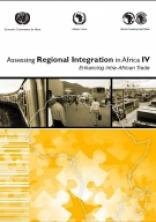Assessing Regional Integration in Africa IV

Africa’s internal trade (intra-Africa trade) has consistently remained minimal compared with its intercontinental trade. The pattern of African exports continues to be heavily influenced by historical links with the rest of the world as more than 80 per cent of African countries’ exports are still destined for markets outside the continent. RECs have fostered trade development through programmes aimed at achieving a free-trade area, a customs union, and a common market. However, numerous initiatives and decades of experimentation with integration in Africa have not brought about any significant levels in intra-REC and intra-African trade.
The production and export structures of most African economies are geared to primary commodities such as minerals, timber, coffee, cocoa, and other raw materials, for which demand is externally oriented. Most lack the industrial capacity for diversified manufactured goods to support trade within regional markets. Sub-Saharan African countries appear to have relatively few goods to trade with each other.
Inadequate infrastructure remains one of the chief obstacles to intra-African trade, investment, and private-sector development. Programmes to cultivate transport and communications networks, energy resources, and information technology would accelerate trade progress and transform Africa into a haven for investment.
The implications of low intra-African trade are many and far reaching. Many opportunities are lost for using trade within the continent to enhance the prospects for specialization between African countries and accelerated development and integration. Intra-African trade can generate development and dynamic integration among African subregions and is a powerful driver of African growth and economic maturity. The main question, therefore, is how to reverse the situation so that African countries can benefit from improved intraregional trade. ARIA IV attempts to address these pressing issues. It undertakes a comprehensive empirical analysis of intra- African trade to determine why it has remained consistently low over the past decades. The report proposes concrete recommendations, to be implemented by member States, RECs, members of the private-sector, and other stakeholders in Africa’s development. It also analyses the various policy issues and other factors that have affected intra-African trade, although these issues may have been addressed in different contexts.